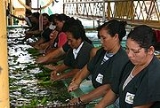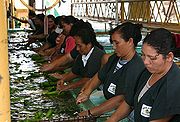
Union of Banana Exporting Countries
Encyclopedia
The Union of Banana Exporting Countries ( or UPEB) was a Central/South American cartel inspired by OPEC
. In 1974 Colombia
, Costa Rica
, Ecuador
, Guatemala
, Honduras
, Nicaragua
, and Panama
joined together in an attempt to form a banana
growers' cartel in respect of exports to the North American market. The Philippines was the only major exporter of bananas to the United States which did not join. The market for banana exports to Europe at this time was quite separate, with European countries being supplied largely by former European (mainly French and British) colonies in the Caribbean, which had privileged access to the European market.
Banana prices had gone up little in 20 years. A UN study had recently concluded that no more than seventeen cents of each dollar spent by North Americans on bananas went to producing countries. At the time bananas were monopolized by three US companies: United Brands Company (formerly United Fruit), Standard Fruit, and the Del Monte Corporation.
UPEB proposed an export tax of one dollar for every forty-pound box of bananas exported. The monopolies protested and threatened to withdraw their operations. There was also a glut on the world banana market and Ecuador, the leading producer, refused to enact the tax. Former Costa Rican president José Figueres stated that Standard Fruit's property should be nationalized if the monopolies refused to pay the tax. Standard Fruit threatened the new Costa Rican president, Daniel Oduber that if there were any more threats, the company would pull out of Costa Rica. Costa Rica dropped its demand to 25¢ a crate.
 In 1974 Honduras passed a law to raise the tax on banana exports from 25¢ to 50¢ per 40-pound box. Honduras had supplied more than 22% of United Brands Company exports in 1974.
In 1974 Honduras passed a law to raise the tax on banana exports from 25¢ to 50¢ per 40-pound box. Honduras had supplied more than 22% of United Brands Company exports in 1974.
The next year, Eli M. Black
, the chairman and president of United Brands Company jumped to his death from the forty fourth floor of the Pan Am Building in Manhattan
. When the Securities and Exchange Commission investigated Black's suicide, it uncovered a scandal called "Bananagate". The United Brands Company had paid a $1.25 million bribe to Honduran President Oswaldo López Arellano
, followed by another $1.25 million dollars the next year. The money was to be put in a Swiss bank account. The operation was managed via then secretary of finance, Abram Bennaton Ramos. After the bribe the Honduran tax was reduced from fifty cents to twenty-five cents per box. This caused the UPEB cartel to collapse. This reduction saved United Brands Company about $7.5 million in tax payments. In addition it was discovered that United Brands Company had paid another $750,000 in bribes to an Italian official to prevent restrictions on United's banana exports to Italy, beginning in 1970. The SEC determined that none of the bribes could have been paid without the knowledge and approval of Black. While it was not illegal at the time for US companies to bribe officials, it was illegal for companies to hide such bribes from their stockholders.
United Brands Company also admitted that it had tried to convince the SEC that the bribes should be kept secret, on the ground that disclosure would hurt the company and its stockholders. The company's Washington law firm, Covington & Burling
, asked the U.S. State Department to intervene, arguing that news of the Honduran bribe could harm U.S. relations with that country. The State Department declined.
When the bribe was revealed, it provoked the overthrow of the military government in Honduras and this in turn led to the nationalisation of United's railroads along with a major divestiture of land by the companies.
Since its formation, the Union of Banana Exporting Countries has been largely limited to charging a modest tax on corporate banana exports.
OPEC
OPEC is an intergovernmental organization of twelve developing countries made up of Algeria, Angola, Ecuador, Iran, Iraq, Kuwait, Libya, Nigeria, Qatar, Saudi Arabia, the United Arab Emirates, and Venezuela. OPEC has maintained its headquarters in Vienna since 1965, and hosts regular meetings...
. In 1974 Colombia
Colombia
Colombia, officially the Republic of Colombia , is a unitary constitutional republic comprising thirty-two departments. The country is located in northwestern South America, bordered to the east by Venezuela and Brazil; to the south by Ecuador and Peru; to the north by the Caribbean Sea; to the...
, Costa Rica
Costa Rica
Costa Rica , officially the Republic of Costa Rica is a multilingual, multiethnic and multicultural country in Central America, bordered by Nicaragua to the north, Panama to the southeast, the Pacific Ocean to the west and the Caribbean Sea to the east....
, Ecuador
Ecuador
Ecuador , officially the Republic of Ecuador is a representative democratic republic in South America, bordered by Colombia on the north, Peru on the east and south, and by the Pacific Ocean to the west. It is one of only two countries in South America, along with Chile, that do not have a border...
, Guatemala
Guatemala
Guatemala is a country in Central America bordered by Mexico to the north and west, the Pacific Ocean to the southwest, Belize to the northeast, the Caribbean to the east, and Honduras and El Salvador to the southeast...
, Honduras
Honduras
Honduras is a republic in Central America. It was previously known as Spanish Honduras to differentiate it from British Honduras, which became the modern-day state of Belize...
, Nicaragua
Nicaragua
Nicaragua is the largest country in the Central American American isthmus, bordered by Honduras to the north and Costa Rica to the south. The country is situated between 11 and 14 degrees north of the Equator in the Northern Hemisphere, which places it entirely within the tropics. The Pacific Ocean...
, and Panama
Panama
Panama , officially the Republic of Panama , is the southernmost country of Central America. Situated on the isthmus connecting North and South America, it is bordered by Costa Rica to the northwest, Colombia to the southeast, the Caribbean Sea to the north and the Pacific Ocean to the south. The...
joined together in an attempt to form a banana
Banana
Banana is the common name for herbaceous plants of the genus Musa and for the fruit they produce. Bananas come in a variety of sizes and colors when ripe, including yellow, purple, and red....
growers' cartel in respect of exports to the North American market. The Philippines was the only major exporter of bananas to the United States which did not join. The market for banana exports to Europe at this time was quite separate, with European countries being supplied largely by former European (mainly French and British) colonies in the Caribbean, which had privileged access to the European market.
Banana prices had gone up little in 20 years. A UN study had recently concluded that no more than seventeen cents of each dollar spent by North Americans on bananas went to producing countries. At the time bananas were monopolized by three US companies: United Brands Company (formerly United Fruit), Standard Fruit, and the Del Monte Corporation.
UPEB proposed an export tax of one dollar for every forty-pound box of bananas exported. The monopolies protested and threatened to withdraw their operations. There was also a glut on the world banana market and Ecuador, the leading producer, refused to enact the tax. Former Costa Rican president José Figueres stated that Standard Fruit's property should be nationalized if the monopolies refused to pay the tax. Standard Fruit threatened the new Costa Rican president, Daniel Oduber that if there were any more threats, the company would pull out of Costa Rica. Costa Rica dropped its demand to 25¢ a crate.
Bananagate

The next year, Eli M. Black
Eli M. Black
E. M. Black was a Jewish-American businessman who controlled the United Brands Company. His son, Leon Black, is a founding member of private equity firm Apollo Management.-Early life:...
, the chairman and president of United Brands Company jumped to his death from the forty fourth floor of the Pan Am Building in Manhattan
Manhattan
Manhattan is the oldest and the most densely populated of the five boroughs of New York City. Located primarily on the island of Manhattan at the mouth of the Hudson River, the boundaries of the borough are identical to those of New York County, an original county of the state of New York...
. When the Securities and Exchange Commission investigated Black's suicide, it uncovered a scandal called "Bananagate". The United Brands Company had paid a $1.25 million bribe to Honduran President Oswaldo López Arellano
Oswaldo López Arellano
Oswaldo Enrique López Arellano was a two-time President of Honduras, first from 1963 to 1971 and again from 1972 to 1975. He gained power both times via military force....
, followed by another $1.25 million dollars the next year. The money was to be put in a Swiss bank account. The operation was managed via then secretary of finance, Abram Bennaton Ramos. After the bribe the Honduran tax was reduced from fifty cents to twenty-five cents per box. This caused the UPEB cartel to collapse. This reduction saved United Brands Company about $7.5 million in tax payments. In addition it was discovered that United Brands Company had paid another $750,000 in bribes to an Italian official to prevent restrictions on United's banana exports to Italy, beginning in 1970. The SEC determined that none of the bribes could have been paid without the knowledge and approval of Black. While it was not illegal at the time for US companies to bribe officials, it was illegal for companies to hide such bribes from their stockholders.
United Brands Company also admitted that it had tried to convince the SEC that the bribes should be kept secret, on the ground that disclosure would hurt the company and its stockholders. The company's Washington law firm, Covington & Burling
Covington & Burling
Covington & Burling LLP is an international law firm with offices in Beijing, Brussels, London, New York, San Francisco, Silicon Valley, San Diego, and Washington, DC. The firm advises multinational corporations on significant transactional, litigation, regulatory, and public policy matters...
, asked the U.S. State Department to intervene, arguing that news of the Honduran bribe could harm U.S. relations with that country. The State Department declined.
When the bribe was revealed, it provoked the overthrow of the military government in Honduras and this in turn led to the nationalisation of United's railroads along with a major divestiture of land by the companies.
Later history
On May 1, 1975, Costa Rica passed a law to raise the tax on banana exports from 25¢ to $1 per 40-pound box. The decree stated that 45¢ of each tax dollar would go to the government and the other 55¢ to subsidize independent banana growers. United Brands' local subsidiary, the Costa Rican Banana Co., then filed a $3 million suit against the government in April 1975, stating that the export levy violated a government guarantee not to tax the company until its contract with the government expired in 1988.Since its formation, the Union of Banana Exporting Countries has been largely limited to charging a modest tax on corporate banana exports.

